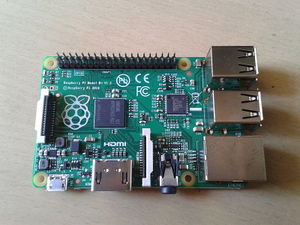Raspberry Pi
 From Conservapedia
From Conservapedia History[edit]
Previously, in 1981, Acorn had worked with the British Broadcasting Corporation to make a low-cost computer available in the United Kingdom for students, but that hardware was out-of-date. The group that resulted in the Raspberry Pi, wanted to create a new computer and also market it under the BBC Micro name, but Acorn own the rights to that name through 2011.[1] So, the project picked a different name, Raspberry Pi.
In 2006, early concepts of the Raspberry Pi were based on the Atmel ATmega644 microcontroller, which had publicly available schematics.[2] Foundation trustee Eben Upton assembled a group of teachers and computer enthusiasts to devise a new computer to inspire a new generation of students.[3] Pi's model A, model B and model B+ are references to the original models of the British educational BBC Micro computer, developed by Acorn Computers.[4] The first model was released in February 2012. In May 2014, the three millionth Pi shipped.[5]
Software[edit]
The Foundation provides Raspbian, a Debian-based linux distribution for download, as well as third party Ubuntu, Windows 10 IOT Core, RISC OS, and specialised media center distributions.[6] It promotes Python and Scratch as the main programming language, with support for many other languages.[7]
Hardware and accessories[edit]
The board contains USB and HDMI ports that will allow connection to keyboard and monitors. Raspberry Pi also sells a camera and expansion boards.
References[edit]
- ↑ Raspberry Pi • View topic - Raspberry Pi as the successor of BBC Micro. raspberrypi.org (22 April 2012). Retrieved on September 4, 2016. “The Foundation trustees tried very hard to get an agreement to use the BBC Micro name, right up to May 2011. /../ Eben touched on the subject a bit during his speech at the Beeb@30 celebration at the beginning of the month: http://www.raspberrypi.org/archives/970 starting at time index 11:30”
- ↑ Wong, George (24 October 2011). Build your own prototype Raspberry Pi minicomputer. ubergizmo. Retrieved on September 4, 2016.
- ↑ Moorhead, Joanna. "Raspberry Pi device will 'reboot computing in schools'", The Guardian, 9 January 2012. Retrieved on September 4, 2016.
- ↑ Williams, Chris (28 November 2011). Psst, kid... Wanna learn how to hack?. The Register. Retrieved on September 4, 2016.
- ↑ RASPBERRY PI AT BUCKINGHAM PALACE, 3 MILLION SOLD. Retrieved on September 4, 2016.
- ↑ Raspberry Pi downloads. Retrieved on Sept 4, 2016.
- ↑ Usage - Raspberry Pi Documentation.
Categories: [Computers]
↧ Download as ZWI file | Last modified: 03/14/2023 06:48:52 | 29 views
☰ Source: https://www.conservapedia.com/Raspberry_Pi | License: CC BY-SA 3.0
 ZWI signed:
ZWI signed:
 KSF
KSF